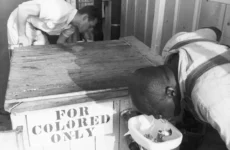Please click the link below to subscribe to a FREE PDF version of each print edition of the Niagara Reporter
http://eepurl.com/dnsYM9
By: Tony Farina
With no guarantee of ever receiving another dime of casino money given the deadlock between the Senecas and the state, Niagara Falls elected officials have nonetheless taken a pass on making hard decisions like possibly enacting a garbage user fee that would have provided a new and much-needed recurring revenue stream.
Financial experts had recommended the user fee to bring in cash to the city in the face of the loss of casino money and sinking bond ratings, but instead Mayor Paul Dyster and the council have opted to raise taxes to near the state constitutional limit to provide enough money to balance next year’s budget with the aid of a $12.3- million state loan.
“I think it is shortsighted,” said Council Chairman Andrew Touma who reluctantly voted for the tax increase last week which passed 4 to 1, with Councilman Chris Voccio casting the lone negative vote. A public hearing had been set on the $168-a-year user fee for Thursday, but now that’s off.
While Touma and Councilman Ken Tompkins voted for the tax increase, both had their reservations and Touma suggested this week that the city has passed up on the opportunity of “making the progress we need, settling for half a loaf, maybe not even a half, when more is needed.”
Touma wants to make it clear he’s not in favor of raising taxes and creating new fees, but he feels it is extremely important to face the reality of the budget crisis in the long term and not settle for a one-time fix given the uncertainty of seeing a resumption of casino cash anytime soon.
Touma wonders how the city will deal with the enormous shortfalls that will be created in that there is no resumption of casino payments to the city following December’s arbitration between the state and the Seneca Nation.
“There were benefits to enacting a user fee,” said Touma, noting as he has in the past that neighboring cities like Buffalo already have garbage user fees in place.
“The user fee could have provided money to build up reserves, help with economic development and create jobs, and give us the recurring revenue stream that the state comptroller has recommended in urging less reliance on casino cash,” said Touma. “But now that opportunity is lost and if there is no settlement of the casino issue, the results could be catastrophic for the city as we are very near our constitutional tax cap.”
The tax increase will bring in $3 million for 2019 and along with the state loan will cover the $13-million deficit. But the concern expressed by Touma is the long-term financial well-being of the city.
Dyster was quoted in the Niagara Gazette as saying the compromise approved last week brings in comparable revenue to the user fee and avoids the need to lay off public safety employees. However, the three-term mayor offered no clue on dealing with the city’s declining fortunes in the coming years.
Dyster and lawmakers have avoided making tough decisions over the last several years, balancing the budgets on casino cash and raiding the reserves, creating a perfect storm now that the Senecas have stopped payments to the state. As of now, there is no casino cash on the horizon and the reserves have weakened to the point that Wall Street has lowered the city’s credit rating, making borrowing more costly.
Dyster claimed the compromise was initiated by Councilman Ezra Scott, Jr., although Dyster was quick to act, avoiding a public fight over a garbage user fee that could have hurt his administration politically in the coming mayoral election where one of his lieutenants, Seth Piccirillo, is an announced candidate.
“We were getting some concessions from Modern Disposal on the user fee,” said Touma, “and as I have said, it has been recommended by the best financial minds advising this council. But it is off the table now and we will continue to look at ways to reduce costs and raise revenue right up until Dec. 1 when the budget goes back to the mayor.”
For 2019 at least, Niagara Falls will cover the deficit. But questions loom about the future, especially without a resumption of casino cash from the Senecas.
As it has in the past, the city has kicked the ball down the road on the financial crisis, hoping for some kind of miracle instead of making the kind of difficult decisions that seem necessary to put the city on solid financial footing.
As Touma put it, this year’s tax hike quick fix is indeed shortsighted given the enormous uncertainty about the outcome of the gaming arbitration scheduled for December. The Dyster-led response does nothing to address the long-term challenges facing the city and hardly gives any comfort to the Wall Street credit rating agencies who rate the city’s bonds.
We’ll know the rest of the story in the coming months as the gaming arbitration gets underway.





















